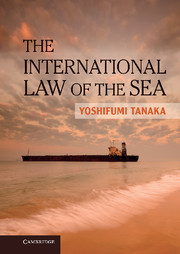Book contents
- Frontmatter
- Contents
- Preface
- Acknowledgements
- Figures
- Tables
- Abbreviations
- Table of Cases
- Table of Treaties and Instruments
- Part I The Divided Oceans: International Law Governing Jurisdictional Zones
- Part II Our Common Ocean: Protection of Community Interests at Sea
- 7 Conservation of Marine Living Resources
- 8 Protection of the Marine Environment
- 9 Conservation of Marine Biological Diversity
- 10 Marine Scientific Research
- 11 Maintenance of International Peace and Security at Sea
- 12 Land-Locked and Geographically Disadvantaged States
- 13 Peaceful Settlement of International Disputes
- Index
- References
12 - Land-Locked and Geographically Disadvantaged States
Main Issues
from Part II - Our Common Ocean: Protection of Community Interests at Sea
- Frontmatter
- Contents
- Preface
- Acknowledgements
- Figures
- Tables
- Abbreviations
- Table of Cases
- Table of Treaties and Instruments
- Part I The Divided Oceans: International Law Governing Jurisdictional Zones
- Part II Our Common Ocean: Protection of Community Interests at Sea
- 7 Conservation of Marine Living Resources
- 8 Protection of the Marine Environment
- 9 Conservation of Marine Biological Diversity
- 10 Marine Scientific Research
- 11 Maintenance of International Peace and Security at Sea
- 12 Land-Locked and Geographically Disadvantaged States
- 13 Peaceful Settlement of International Disputes
- Index
- References
Summary
By reason of their geography, land-locked and geographically disadvantaged States cannot fully use the oceans and it is thus not surprising that these States have sought to safeguard their special interests. As a consequence, the LOSC provides specific rules with regard to the rights of land-locked and geographically disadvantaged States. As these States are also members of the international community, it is important to secure their right to engage in marine activities. Thus this chapter will address particularly the following issues:
What are land-locked and geographically disadvantaged States?
Do land-locked States have the right of access to and from the sea?
Do land-locked States have navigational rights?
To what extent can land-locked and geographically disadvantaged States participate in the exploitation of natural resources and marine scientific research in the EEZ of another State?
Introduction
‘Land-locked State’ means a State which has no sea coast. Land-locked States are distinct from other States in one decisive fact: they lack access to and from the sea. As of January 2011, there are forty-five such States which, in an international community of approximately two hundred States, makes a significant group (see Table 12.1). As for other States, the oceans are important for land-locked States as a means of communication and a reservoir of marine natural resources. From economic and strategic viewpoints, it would be no exaggeration to say that the survival and prosperity of land-locked States rely on their freedom to communicate and to trade. Thus the safeguarding of the interests of land-locked States becomes a significant issue in the law of the sea. Indeed, the Preamble of the LOSC explicitly refers to ‘the interests and needs of mankind as a whole and, in particular, the special interests and needs of developing countries, whether coastal or land-locked’.
- Type
- Chapter
- Information
- The International Law of the Sea , pp. 376 - 389Publisher: Cambridge University PressPrint publication year: 2012



